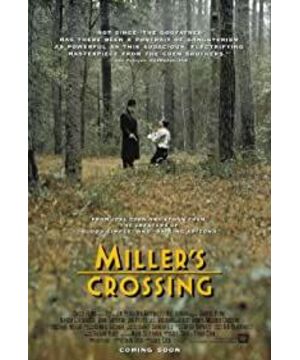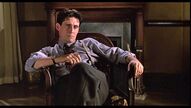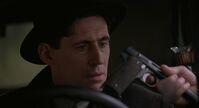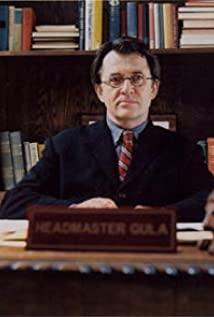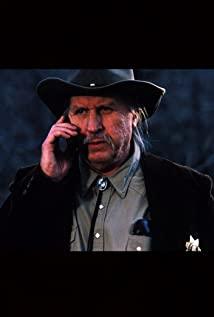As one of the directors with independent editing rights, the Coen brothers have always firmly grasped the script, actors and post-production. (Oxun Wells burst into tears) Of course, for the general audience:
often we can’t see or understand the script, and
most of the actors don’t know (Of course, if there are famous actors in the Coen Brothers movies, it’s often There will be varying degrees of damage to the movie itself: George Clooney wears a stubble old face of "I'm very attractive"; Brad Pitt smiles "I'm famous in Hollywood"; Tommy Lee Jones squints The bags under the eyes of "I've seen through the world a long time ago" were swaying everywhere, Tom Hanks put on a posture, changed his simple and honest nature), and the
whole story was even more half-understood (Many of our classmates pretended to understand after reading it. One spot).
Where do the "raising Arizona" motorcyclists come from?
"Barton Fink" is on fire in the hotel, is the beach girl real?
"Murder Green Toe" Where did the money go?
What does the "Old Nowhere" killer want?
What does "serious man" mean?
"Thunder from the Earth" Why did the little girl fall into the snake hole and amputate her limbs
? For this film: What is the purpose of Tom? It has never been known. Of course, in this case, viewers who have lost their understanding of the development of the story can't help but fall into pain or fascination. The former may be lethargic or angrily deleted, and the latter may write a bad article. But in any case, the United States in the mirror of the Cohen brothers is undoubtedly one of the truest images of the United States. This benefits from the following aspects.
1. The construction of the external environment—the characteristics of the times and the characteristics of the region
. Most of the Coen brothers’ films have a clear background of the times or the characteristics of the region (sometimes there are both, and sometimes there are neither, which are usually Think it is mediocre).
"Blood Labyrinth" is in the Texas desert;
"Raising Arizona" in the late Reagan administration,
"Miller's Crossroads" in the Prohibition Period;
"Barton Fink" in New York and California on the eve of World War II;
"Ice and Blood Storm" in Minnesota;
"Murder of Green Toes" in California during the Gulf War;
"Money Empire" is estimated to be
"the old and nowhere" on the US-Mexico border during the Coolidge administration ;
"Serious people" I guess it was in the late 1960s or later (Jefferson Spaceship, Hatcher Boy, record player, tape and stereo).
The remake of the "Old Woman Killer" is in the South; "The Land of Thunder" certainly
looks like this in the pioneering era . The Coen brothers' movies cover almost all of the unique eras and regions of the United States. Among them, the "epoch" often brings people an "elegy", and the "region" often brings people the local customs. These two factors often make people feel interesting because of their "variability", but at the same time it is difficult for people to discover the universal laws that exist under the times and regions, so humans will have misunderstandings and disputes for a long time.
Different from other movies, we often turn a blind eye to the regional and epochal characteristics of the Coen Brothers films. This is where the Coen Brothers’ outstanding expressiveness lies: no matter what era or regional background, human behavior always has commonalities. Yes: Texans are religious and a little bit fierce, Minnesota people are slow in both movement and language, and Californians are relaxed and casual. But these people without exception have human reason and logic, but they also have the instinct of animals to seek advantages and avoid disadvantages (that is, "spirit and flesh"). When the two are out of proportion, bright and interesting people and stories are formed.
The film also introduced a group of very characteristic people under the outer shell of the Prohibition Period (filled with the words "what's the rumpus?" "whack him"). For common gangster movies in the Prohibition Era (such as The Past in the United States), there are many love, hatred and hatred in this movie, but they constitute a completely different story. This is due to the shaping of the characters. And it makes this story with an old shell look like it can even continue to this day.
2. Characterization
Tommy:
Tommy's motives seem difficult to understand at first glance. It is difficult for the audience to understand him. In the play, people say he is "smart", Leo and Casper bosses like him to be smart, Bernie thinks he is not as smart as himself, and Eddie treats his "smart" as "killing Matt", and I wish he could not get rid of it. Quickly afterwards. In fact, only Verna knows how smart he is, because only Verna is the same with him—an outsider in the cracks.
Of course, only the director knows how this image is shaped in a movie as a story. In fact, as a Jewish director, "unknowable" is an eternal and subtle topic. In this film: Although the characters or the audience in the play can see the facts with their eyes, it is difficult for everyone to understand the purpose and psychology of the characters.
In terms of the facts: Tommy’s “smartness” always comes from judging the situation and believing in: “you always do things for a reason”, adopting the most compromised plan with the least losses for both parties. This is also what people in the play say. approved.
1. For the early balance between the Italian Gang and the Irish State, the best choice was to sacrifice Bernie, who did not follow the rules (undermining the economic order of the Prohibition Era). "The mayor and the police chief are obedient, what are you doing? Of course, in order to relieve his depression, he went to bet on horses and lost money as expected, which deepened his dislike of Bernie.
2. Developments: Leo mistakenly thought that the Italian gang killed the stalking members of the gang and smashed the bar of the Italian gang. The Italian gang failed to assassinate Leo, which intensified the conflict. When Tommy failed to convince both Ferna and Rio at the same time, he could only "really" (only he knew it was pretend) to transfer and join the Italian team.
3. At the intersection of Miller, Tommy released Bernie because of "love" (just disappear, there is no need to kill, in order to retain Verna's "love"). Since then, things have gradually gotten out of control.
4. Bernie’s blackmail from the other side made Tommy always want to find a chance to kill him. From the perspective of finding the "soft-footed shrimp", Tommy is quite smart, but most of his smart actions cannot escape Eddie’s Follow the shoot and torture its participants, and at the same time, every clever action can't escape the eyes of the audience. This, without exception, embodies the important point of the Coen Brothers film "plan meets impermanence". At this time, the director made the audience and Tommy feel this at the same time: Tommy vomited uncontrollably when he returned to Miller's crossroads, but recovered a dog's life. Tommy tried to find and kill Bernie through "Soft-footed Shrimp Johnson" but was followed by Eddie, and again recovered a dog's life when he was almost strangled to death.
5. Towards the end, after Casper's death, killing Bernie is only an option: kill Bernie to get Leo's "love" and Verna's hatred; leave Bernie to gain Verna's love. Of course, the latter is a bit stronger, because if you kill Bernie Verna will definitely turn his face, and if you keep Bernie don't understand, Tommy may only suffer some loss of reputation. But at this time Tommy is already on the verge of losing control. Reason and "love" have been suppressed by a series of beasts brought about by a series of strong psychological pressures, so he begged to "look into your heart" (look into your heart) Naturally and coldly responded to "what heart" (what heart) and pulled the trigger.
In the end, everyone thinks that Tommy cleverly managed the Italian gang, and only he (and perhaps Ferna) can experience the silence and sorrow in his heart.
Kaspa:
Kasper has wives and children. Of course, he loves his fat son very much, and he also has time to listen to his fat wife's quick nagging. Compared to the Irish boss who runs a gang like a business, he is more like a family.
For the gangsters, in fact, they can't get away from the essence of "cutting the man". Prohibition has undoubtedly caused a certain negative economic impact on American society, so the smuggling business is naturally very popular. No wonder the police chief and the mayor in the film negotiate with the two bosses every day. The Chief of Police-Irish Ulduar has repeatedly complained about this: For that stinky boy Bernie, the two bosses are at odds with each other. Is it worth it?
At the same time, Casper, who has a wife and children, values overall interests and subordinates more than Leo boss who is in love, but at the same time he is more credulous. For Eddie, who is loyal but fierce, and Tommy, who looks smart because of his coldness and calmness, Eddie has naturally fallen into a deeper predicament.
Finally, as a domestic boss, Casper hates the destruction of order and the challenge of authority most. In the film, Leo and him are authorities, and the rest are not. So he discussed the matter with Leo at first, which is undoubtedly in line with order and authority. But the irrational Leo didn't care about it at all; Tommy was unwilling to recognize him and betray Bernie at first; the mayor was embarrassed by his request in the middle and late stages of the film. So they all suffered from Casper's hoarse roar: stinky shelf! (High-hat!)
At the end of the film, when the order and authority of the Prohibition era disappeared, the rationality built on this system was naturally defeated by impermanence, and Casper was buried in the stairs.
Mink: Mink is
cunning and sensitive, not much different from Bernie. Because of fear, he killed the wig gang member who followed the tip, but the wig was taken away by the passerby. For the boss of Rio, he couldn't understand why, this small incident became the only mystery for people in the film (of course, the audience seemed to be very interesting).
Bernie
Bernie is called the "Jew" and belongs to the rule-breaker. Of course, he also abides by the principle of "plan meets impermanence" in the film. He thought that his sister's lover would not betray him but was betrayed. He thought he was going to die but got back a dog's life. But when he tried to get rid of his dangerous situation through a cunning and dangerous plan and finally get rid of the biggest threat-Casper, he was shot in the center of the forehead by Tommy.
Here, the Coen brothers gave us a typical sample, that is: Relying on sophisticated calculations and rational speculation, it may be possible to obtain a "probabilistically feasible" conclusion, but in actual operation, don't forget the risk and irrational. Animal instinct. Of course, the Coen brothers only expounded this truth positively in the "serious people" after more than ten years.
Drop Johnson
The soft-footed shrimp Johnson played the role of "howling fat man". As a poor man with little education and almost illiterate, his mind is almost childlike: eating milk cereal, reading comics and newspapers, and passing Bernie dangerously. Earn a little money (which reflects his ignorance), and screamed in fear when he witnessed the tragedy of the iron shovel sticking to his face. It embodies the most direct reflection of the primitive fear of animality.
Another fat man howling in the film is the fat woman Tommy ran into. Compared to her sturdy figure, the bag she used to hit Tom was pitiful. This also reflects the unfair society and distorted fashion tastes of the Prohibition Period.
Sam Remy:
Sam Remy plays a thug with two revolvers. First, he killed the surrendered Irish bandit with one shot, and then he was killed. Thomson was killed with a submachine gun.
Of course Sam Remy became famous as "Ghost Man" (more commonly known as "Spiderman"). In this film, the fast-advancing photographic method of the lens in "Ghost Man" is directly copied to the scene of Eddie's death at the end: "Softfoot Shrimp Johnson" howl of fear and the roar of Casper boss. It undoubtedly caused pressure on Tommy and the audience. As the boss of Ireland,
Leo
is obviously irrational. Of course, in the chaotic age of prohibition, keen intuition can often overturn reason. Visiting unexpectedly late at night, Thomson's submachine gun counterattacked sharply and fisted with his most loyal subordinates. All of them reflect Leo's rich experience and keen sense. However, as a man of temperament who had difficulty following the rules, he immediately lost the support of the mayor and police chief, and the taverns were smashed one after another.
But what is ridiculous is that Caspar died in vain, covering up Leo's irrationality and accidentally letting the outsider Verna who had lost communication and support to attach her. The rational Tommy left
Eddie sadly :
Eddie was fierce and loyal, and hated clever people. Once said to Verna, "As soon as I speak, the whole world becomes smarter." In the blink of an eye, he subdued Ferna who was armed with a gun, and killed two of Rio's men. Later, the fat beat Caspar's tick-tack and Frankie to force a confession, and then he beat the soft-footed shrimp to force a confession again. It's a pity that when he failed to find Tommy's little tail, he lost his life under the gun of the boss he had followed for a long time.
Eddie strictly wears a tie fixed with a pin (he is the only person dressed like this in the play), and relies on continuous rational and persistent investigation to stop Tommy's impermanence, but he is defeated by his boss. This also reflects the theme of impermanence over reason.
Vernna
is the most special character, she is the only one who uses and only uses "love" to guide behavior. She uses "love" to protect Bernie with herself, and uses love to fight Tommy. Compared with Leo's courtship and Tom's Sony music love, Verna's love is undoubtedly much more meaningful. However, the purer the "love" burns, the faster it will disappear. When the things she built with love disappeared, Verna could only find herself the ultimate destination of love.
This is also one of the recognition of women by the Coen brothers. In their view, from an unfaithful wife (blood labyrinth) to a pregnant police officer (ice blood storm), from a former police officer who married a former criminal to a religious black woman. They all use pure "love" to guide behavior, to surpass and overcome abused reason.
Attachment: Typical characters
in the Coen Brothers movies. The protagonist in trouble: The
Howling Fatty in All Movies : All the roles played by "John Goodman", the detective in the blood maze, and of course, may also include the wife-robbing in "Serious Man" person
female hero: almost all female
fickle authority figures: All the "boss" image: including studio gangsters, entrepreneurs
mysterious wise man: All aside, western bar old man, old blind rolled railway
for the film Say:
the protagonist in trouble: the
howling fat man tommy : the drop Johnson
heroine: vernna
fickle authority figures: leo and kaspa
mysterious wise men: almost none, maybe vernna is also in the film
3. narrative structure and imagery
What is less known is that the filming of "Miller's Crossing" experienced an interruption and stagnation. During the interruption, the Coen brothers created the film "Barton Funk". It now appears that these two films have the same cause and completely different results. Tommy was deemed a success, but his heart was full of loss. Barton Fink created a good script but was scolded by the boss. Despite this, he returned to his ideal dream of the beach.
We will never know why it was interrupted, but the author casually guessed that in shooting such a "out of control" and "unknowable" film, the shooting process itself became "out of control" and "unknowable", so the director turned to the depths of his heart. Seek direction.
Regarding "out of control" and "unknowable" In the Coen brothers' movies, people often fall into a desperate situation that is diametrically opposed to their own temperament and preferences. Freed from this situation, you will become a superman, otherwise you will fall into the abyss.
"Barton Fink" traditional playwright wrote a play about the soul of
"The Big Lebowski" the most lazy, "Governor Lord" must assume the risk of
"Old Men" hunter killer must deal with
"serious people" the most peaceful University professors must deal with the injustice
"Thunder from the Ground" The little girl must deal with the Wild West and the gangs.
When everything is under control, the screen is filled with unknowable and mysterious.
Although they are American directors, the Jewish origin of the Coen brothers subtly influences their creative style, and they naturally incorporate their subjective perceptions of their people into their works. The Coen brothers' films imitated the unknowability of life itself. Although they embodied the mystery and unknowability in Jewish theology, the Coen brothers often laughed at their religion and their circumstances through the film, and finally laughed at themselves. These include:
The cunning Jewish man in "Miller's Crossroads" in
"Barton Funk", the neurotic writer in "Barton Funk" and the vice president of Vinono,
"Murder of Green Toe", the fake Jew who was assimilated by his ex-wife, but gave a German pistol name ( Walther, the Walther p-38 is a fat Polish man with a well-known standard pistol in World War II (Poland and Germany are quite anti-Semitic in history)
"Serious people" in the old-fashioned church school, strict doctrine and rituals.
Of course, the Coen brothers only presented the unknown to the audience. The ignorance and indifference of the people in the game surprised the audience, but the audience also played in their own lives. The role of ignorance. Unlike Christian predestination, grace, and justice, the lost redemptive nature of Judaism makes the author under its cultural influence more divergent and lack of stereotypes. But because of this it is particularly fascinating.
In conclusion
, Miller’s crossroads may not have enough elegy to the era, nor can it reach the gloomy style of film noir. It is not as easy to appreciate as "Once Upon a Time in America" or Humphrey Bogart’s series of films. But it also emphasizes a reconciliation of "cause must result" and "mystery and unknowable". Therefore, Miller's Crossroads can be regarded as the most outstanding and well-deserved masterpiece of this theme.
View more about Miller's Crossing reviews


